Hyundai Kefico introduces new hydrogen gas sensor
31 March 2023
 Hydrogen sensor from Hyundai Kefico (Photo: Sensirion)
Hydrogen sensor from Hyundai Kefico (Photo: Sensirion)
Hyundai Kefico, a South Korean manufacturer of vehicle components and systems, has introduced a new hydrogen gas sensor capable of detecting even the smallest leaks in onboard vehicle systems. The sensor hardware was supplied by Sensirion, a German sensor specialist.
The sensor operates in real time to rapidly detect any anomalies and ensure driver safety. Once a hydrogen leak is noted, the sensor outputs a signal in the form of analogue voltages. The vehicle systems can then initiate the relevant safety mechanisms.
“Sensirion and Hyundai Kefico are both committed to creating a cleaner and more sustainable world,” said Moonsung Shin, team manager for Sensor Design at Hyundai Kefico.
“Thanks to this invaluable partnership, we have succeeded in developing a hydrogen detector sensor that achieves maximum durability and reliability, even in the harshest environments.”
The new sensor is particularly important considering the anticipated proliferation of hydrogen-fuelled vehicles using both H2 internal combustion and fuel cells. Hydrogen has a lower ignition energy than petrol or natural gas (methane), allowing it to combust more easily. Sensing leaks is critical to vehicle security.
The new sensor can be used across the H2 fuel system, including fuel tanks, delivery systems and fuel cell stacks.
STAY CONNECTED




Receive the information you need when you need it through our world-leading magazines, newsletters and daily briefings.
POWER SOURCING GUIDE
The trusted reference and buyer’s guide for 83 years
The original “desktop search engine,” guiding nearly 10,000 users in more than 90 countries it is the primary reference for specifications and details on all the components that go into engine systems.
Visit Now
CONNECT WITH THE TEAM










